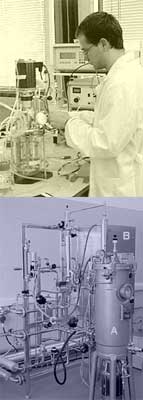Development of thirdgeneration
hormones
 With support from Fondef, Corfo,
and the private sector, specifically
Recalcine Laboratories, the
research group of the Natural
Products Chemistry Laboratory,
headed by Dr. Mario Silva, is
looking for ways to produce useful
compounds for the Chilean
pharmaceutical industry with
cellulose residues. With support from Fondef, Corfo,
and the private sector, specifically
Recalcine Laboratories, the
research group of the Natural
Products Chemistry Laboratory,
headed by Dr. Mario Silva, is
looking for ways to produce useful
compounds for the Chilean
pharmaceutical industry with
cellulose residues.
The biotechnological research
developed by the researchers of
this Laboratory of the Faculty of
Natural and Oceanographic
Sciences has contributed to the
generation of new products based
in phytosterols obtained from a
cellulose industrial residue: tall
oil.
Through the development of a
biotechnological process, the
phytosterols are transformed into
a product of great commercial
value: Androstenedion, precursor
of the sexual and cortical
hormones with a great
international demand. This
process has permitted the
formation of a perfect link
between market requirements
and technological development,
obtaining compounds that will be
of great use in the national
pharmaceutical industry.
In addition to the economic
benefits that this work could bring
to the country, it has prepared
an important number of young
researchers and technical
personnel as specialists in the
theme. These new researchers
are now developing projects to
functionalize different positions
of the steroid molecule to obtain
the latest generation of hormone
intermediaries for therapeutic
use, opening in this way the
commercial perspectives of the
project Development of
Biotechnological Processes for
Third-Generation Hormone
Production, that has been
functioning since 2001.
To develop this project, the
Laboratory receives financing
from the Universidad de
Concepción, Fondef and Corfo’s
Innovative Development Fund. To obtain support from Fondef
and Corfo, the support of the
private sector, in this case,
Recalcine, was essential.
Among the project’s benefits are
the active beginning that actually
are not produced in Chile and,
consequently, had to be imported,
influencing in both the economic
and scientific aspects. In this
way, this type of project should
provide, within a few years, a
transcendental change in the
national pharmaceutical industry,
transforming it into an exporter
of high added-value products,
which are actually only produced
in developed countries.
University - Industry
Since 1996, Recalcine
Laboratories has supported this
research related to steroid
hormones. In this way, the
pharmaceutical corporation has
strives to become the first Chilean
laboratory that counts with the
scientific capacity to produce, in
the short term, steroidal medicine
in Chile.
The University-Industry relation,
like the work he is doing with
Recalcine, offers benefits in both
economic and academic areas.“It is important for us to work
with the private sector because
the financing agencies request
that our projects be current and
of national interest, and that this
interest be demonstrated with
financial support. Consequently,
they need to be projects that can
be applied. Additionally, the only
way to improve the country is
through good quality science that
is important to industry.” |

